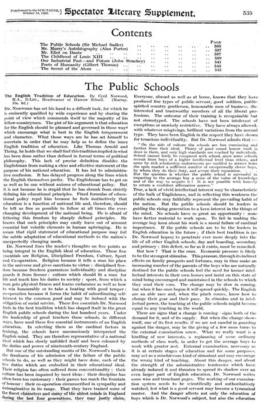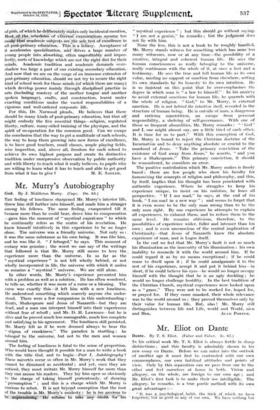The Public Schools
The English Tradition of Education. By Cyril Norwood,
M.A., D.Litt., Headmaster of Harrow School. (Murray. 10s. 6d.)
Da. NORWOOD has set his hand to a difficult task, for which he is eminently qualified by wide experience and by sharing the point of view which commends itself to the majority of his
fellow-countrymen. The gist of his argument is that education for the English should be planned and governed in those ways which encourage what is best in the English temperament and character. What those ways are he has set himself to ascertain in order that he may help us to define the inner English tradition of education. Like Thomas Arnold and Thring, he holds that we shall find this tradition implied in what has been done rather than defined in formal terms of political philosophy. This lack of precise definition disables the Englishman from making a clear and effective statement of the purpose of his national education. It has led to administra- tive confusion. It has delayed progress along the lines which the English themselves prefer. The Englishman has to get on as well as he can without axioms of educational policy. But it is not because he is stupid that he has shrunk from strictly defining his educational principles. Fixed formulas of educa- tional policy repel him because he feels instinctively that education is a function of national life and, therefore, should be left as free as possible to follow at all times the ever- changing development of the national being. He is afraid of fettering this freedom by sharply defined principles. He knows that such principles may easily leave out of account essential but volatile elements in human upbringing. He is aware that rigid statement of educational purpose may foil the subtle adaptation of educational methods to the nation's unexpectedly changing needs.
Dr. Norwood fixes the reader's thoughts on five points as being integral in the English ideal of education. These five essentials are Religion, Disciplined Freedom, Culture, Sport and Co-operation. Religion because it tells a man his place in the universe and gives sanctions to virtue : disciplined free- dom because freedom guarantees individuality and discipline guards it from licence : culture which should fit a man for life and teach him his duties to society : sport, from which a man gets physical fitness and learns endurance as well as how to win honourably or to take a beating with good temper : co-operation because it forms the habit of subordinating self- interest to the common good and may be imbued with the obligation of social service. These five essentials Dr. Norwood finds in the best tradition which hits shaped itself in the great English public schools during the last hundred years. Under
the leadership of great teachers these- schools, in different ways, have used these five essential instruments of an English
education. In selecting them as the cardinal factors in training, the schools have unconsciously interpreted the English mind. They are therefore representative of a national ideal which has slowly unfolded itself and been coloured by the duties and power of nineteenth-century England.
But one of the outstanding merits of Dr. Norwood's book is. the frankness of his admission of the failure of the public schools to do, as well as they might have done, each of the five duties which are embodied in their educational ideal. Their religion has often suffered from conventionality : their
culture has been impaired by inert ideas : their discipline has often been too customary : their games too much the fountain of honour : their co-operation circumscribed in sympathy and uniinaginative in its range. , That they have trained some of the finest characters _and many of the ablest misds in England 'taring the last four generations, they may justly claim,
Everyone, abroad as well as at home, knows that they have produced fine types of public servant, good soldiers, public- spirited country gentlemen, honourable men of business, dis- interested and trustworthy members of all the liberal pro- fessions. The outcome of their training is recognizable but not stereotyped. The schools have not been intolerant of exceptions or unwisely restrictive. They have always allowed.
with whatever misgivings, brilliant variations from the normal type. They have been English in the respect they have shown for tenacious individuality. But Dr. Norwood admits that :—
" On the side of culture the schools are leas convincing and further from their ideal. Plenty of good sound honest work is done in them, and very high standards are reached by individuals. School cannot fairly be compared with school, since some schools recruit from boys of a higher intellectual level than others, and some by rich scholarship endowments are enabled to attract from the open market a sufficient number of exceptionally clover boys, by whom they do their duty, and secure their reputation. . . . But the question is whether the public School is successful in imparting to the average boy a sense of the value of knowledge and of the way to acquire it / It is not possible with honesty to return a confident affirmative answer."
True, a lack of vivid intellectual interest may be characteristic of the bulk of Englishmen, and in reflecting this weakness the public schools may faithfully represent the prevailing habit of the nation. But the public schools should be leaders in guiding the rising generation to a keen interest in the things of the mind. No schools have so great an opportunity : none have better material to work upon. To fail in making the average boy keen about his work is a moral failure of cardinal importance. If the public schools are to be the leaders in English education in the future ; if their best tradition is (as Dr. Norwood hopes) to penetrate ever more deeply into the life of all other English schools, day and boarding, secondary and primary ; this defect, so far as it exists, must be remedied. But how ? That is the crux. Econoinic pressure is likely to be the strongest stimulus. This pressure, through its indirect effects on family prospects and fortunes, may in time make an increasing number of the parents of the boys who are naturally destined for the public schools feel the need for keener intel- lectual interests in their own homes and insist on this state of mind being encouraged and maintained in the schools to which they send their sons. The change may be slow in coming, but when it has once begun it will spread quickly. The English are an able race and, when the pinch comes, know how to change their gear and their pace. In stimulus and in intel- lectual power, the teaching at the public schools might become equal to any teaching in the world.
There are signs that a change is coming—signs both of the demand for it, and of its supply. But when the change shows itself, one of its first results, if we are not careful in guarding against the danger, may be the giving of a few more turns to the external examination screw. What we really want is a kindling of new interests, a replanning of some ordinary methods of class work, in order to get the average boys to work with greater zest. External examination, necessary as
it is at certain stages of education and for some purposes, may act as a mischievous kind of stimulant and may encourage the wrong kind of teaching. About this danger, and about the strength of the administrative tendencies which have already induced it and threaten to spread its shadow over an even larger part of English education, Dr. Norwood writes some wise and trenchant pages. The working of our examina-
tion system needs to be scientifically and authoritatively watched, lest what is a good servant may become a tyrannical master. And the danger affects not only the education of boys which is Dr. Norwood's subject, but also the education of girls, of which he deliberatebirnakes only incidental mention.'
of. -atet:nal -examitintiqns assume too edelik-4,Watafeadeniic subjects are Ihe solq_test of excellence in all post-priniary edueatioa.. This is a fallacy. Acceptance of it accelerates specialization, and:drives a large number of young people into_ absorbing, often unprofitably, and imper-: fectly, sorts of knowledge which are not the right diet for their minds. Academic tradition and academic deMands over- shadow too large a "part of our existing secondary education.- And now that we are on the verge of an immense extension of - post-primary education, should we not try to secure the right kind of school work for those minds (Of which there are many) which developpower Mainly through disciplined practice arts (including mastery of the mother" tongue and another- spoken language), crafts, and construction, learnt under exacting conditions under the varied responsibilities of a- vigorous and well-ordered corporate life.
For this, Dr. Norwood pleads._ He belieyes that there should be many kinds of post-primary education, but that all: might embody the five essential things—religion, regulated. liberty, culture, many-sided training of the physique, and the spirit of co-operation for the common good. Can we escape the conclusion that the way to get a multitude of such schools,. the way to keep them growing into new forms of excellence,. is to have good teachers, small classes, ample playing fields, wise inspection, and, above all, freedom for each school to . achieve its own highest purpose and create its distinctive tradition under unrepressive observation by public authority and with liberty to teach what it really, believes, to pupils who are willing to learn what it has to teach and able to get good























































 Previous page
Previous page